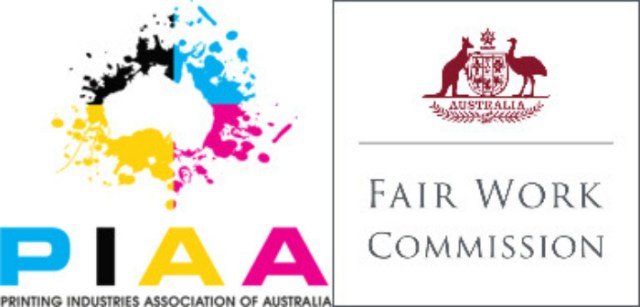
The Real Media Collective has kicked off its series of Rebuild Together webinars with IR expert Charles Watson providing guidance on JobKeeper and how Covid-19 amendments to the Fair Work Act and industrial awards affect print businesses.
Watson is a well known figure in the printing industry and recently joined the Collective as the general manager of IR, Policy and Governance.
A useful link to the ‘Class Notes’ of the webinar can be found here.
A recording of the webinar can be found here.
In the first of a series of webinars designed to help print business owners navigate the economic ramifications of the pandemic and find their way through to a post-coronavirus world, Watson has given some helpful guidance on the JobKeeper scheme and other matters related to industrial relations.
He covered off some important facts about the recent amendments to the Fair Work Act that were rushed through into legislation to support the $130 billion JobKeeper scheme.
Fair Work Act amendments – what these mean for employers
It is important to note the Fair Work Act amendments which provide for a range of additional ‘enabling’ provisions for JobKeeper eligible employers and employees are temporary and operate from April 9 to September 28, Watson said.
“As part of the JobKeeper scheme, the government has amended the Fair Work Act and that is to provide a range of additional provisions not least which are what are called ‘enabling’ provisions. These amendments are effective from the 9th April. I would caution that some of these provisions provide the right to direct employees while others provide the right to request. Essentially it is all about reasonableness and necessity and ultimately saving jobs,” Watson said. 
Under the amended provisions, eligible employers who have qualified for the JobKeeper wage subsidy are permitted to “vary” the work conditions, as in the days and hours of work, location of work and types of work, of an employee who has also been signed up to JobKeeper.
The provisions permit employers to give stand down directions to eligible employees when the staff member cannot be usefully employed for their normal work days and hours.
“This can be due to business shifts caused by Covid-19 or by a government initiative or direction. Under this particular provision an employer can direct an employee to not work on the particular days they would ordinarily work or work for a shorter timeframe or work a reduced number of hours and that includes no hours at all,” Watson said.
“Such a direction is genuinely seen to have an effect even if it is inconsistent with an enterprise agreement or a contract.”
The amendments also allow employers to direct a JobKeeper participating staff member to undertake different duties and/or work from a different location.
“If you need to give employees such a direction you need to ensure those duties that you are requesting they perform are safe having regard to Covid-19. The employee has to be qualified to undertake those duties so you can’t just ask an administration employee to work the forklift unless they are ticketed. The duties have to be reasonably within the scope of the business,” Watson said.
It is also possible for eligible employers to enter into agreements with employees to change ordinary working days and times and request an employee to take annual leave (including at half pay) so long as this doesn’t reduce their leave balance to less than two weeks, Watson said.
JobKeeper disputes
Employers and employees can lodge a JobKeeper related dispute with the Fair Work Commission, Watson said, adding the Fair Work Commission cannot assist with Australian Taxation Office-related disputes about whether an employer is or isn’t entitled to receive JobKeeper.
The Fair Work Commission will also not deal with underpayment claims relating to JobKeeper.
Watson pointed out there are hefty fines for non-compliance in relation to JobKeeper payments with an individual facing an up to $12,600 fine and a company $126,000 for underpaying JobKeeper.
He said the Fair Work Commission had already received 120 applications over JobKeeper related disputes with Covid-19 featuring increasingly in unfair dismissal cases.
JobKeeper
While not being a “silver bullet” that will necessarily save the economy, Watson said the $1500-a-fortnight measure is to be commended and will go a long way towards helping keep employees working.
Watson said many businesses had struggled to interpret the scheme and had found the application process testing as employers worked out if they were eligible and then sought agreement from their employees about participating in the scheme.
Payments to eligible businesses are due to kick in this week and the application period has now also been extended until May 31.
“The ATO pays JobKeeper payments to qualifying employers for eligible employees, as a reimbursement monthly in arrears, beginning in May 2020 until 28 September 2020,” Watson said.
“Until the JobKeeper subsidy payments are paid, eligible employers are meant to have been paying eligible employees at least the $1500 per fortnight, whether working or stood down.”
Industrial Award amendments
These award amendments, contained in Schedule X, are effective from April 8 until June 30 2020:
Unpaid pandemic leave: An employee is entitled to take up to two weeks’ unpaid leave if the employee is required by government or medical authorities or on the advice of a medical practitioner to self-isolate and is consequently prevented from working. This must start before June 30, 2020 but may end after that date.
It also sets out a Minimum Payment Guarantee.
This requires eligible employers who receive JobKeeper payments must ensure that for the fortnight that the employer is entitled for the payment that eligible employees are paid the $1500 or the amounts payable during the fortnight.
Watson said in some cases this will mean employees will receive more pay but that is a “by product of the government scheme and can be seen as a short term windfall”.
Conversely, he said, employers cannot ask employees to work extra hours that will equate to $750 a week and cannot coerce employees to do so.
Workplace Health & Safety
Watson said it would be a good idea to regular check workplace health and safety standards are where they need to be, especially as many staff may feel anxious about catching coronavirus while at work.
He advised checking in with your staff on regular basis, especially given the apparent spike in mental health issues and the likelihood this will only increase.
He also pointed to an increase in domestic violence and advised employers to ensure the appropriate policies and processes are in place to deal with these issues for employees.
“It would not be inappropriate to undertake a weekly review of your workplace health and safety measures that you have implemented as a result of Covid-19,” he said.
If you have any questions for Charles Watson please contact him at charles@thermc.com.au or the Collective team (hello@thermc.com.au).
The next Rebuild Together webinar will be held next Wednesday May 13 at 11am with Deborah Corn speaking about Reinvention post covid-19.
For more information please visit: https://www.therealmediacollective.com.au/
Comment below to have your say on this story.
If you have a news story or tip-off, get in touch at editorial@sprinter.com.au.
Sign up to the Sprinter newsletter



